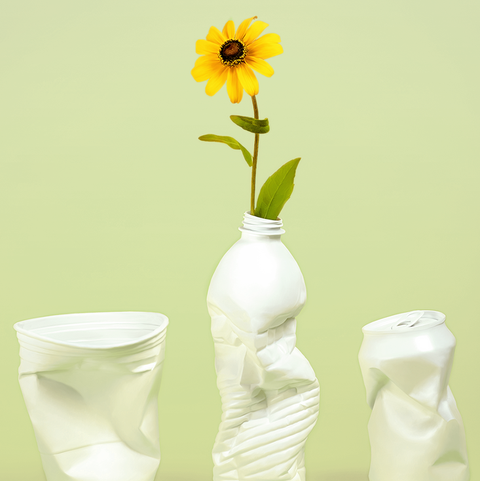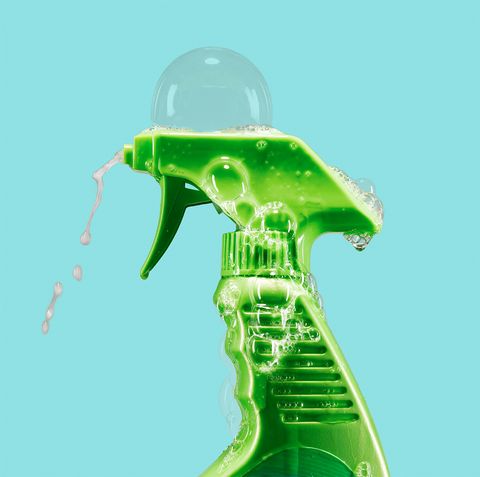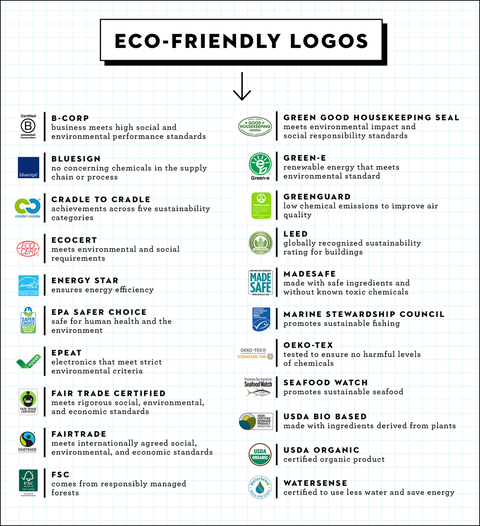- “Greenwashing” refers to deceptive internet marketing promises made by organizations to falsely counsel an environmental gain.
- Most shoppers aren’t familiar with the time period greenwashing, but examples of untrue, unverified or unsubstantiated “eco-friendly” or eco claims exist in pretty much each classification of buyer merchandise.
- There are basic approaches that savvy consumers can shield them selves.
When it will come to what we get, the broad majority of consumers are interested in producing greater, a lot more sustainable possibilities for the earth. In simple fact, in the Excellent Housekeeping Institute’s current sustainability study, only a mere 2% of respondents aren’t concerned with building “inexperienced” decisions at dwelling.
The problem is that creating genuinely environmentally friendly choices can be more complicated than you may believe – and it is not unusual for brands to declare to be “green” when they aren’t. You in all probability know the term “whitewashing,” which refers to glossing in excess of scandalous, unsafe info by presenting the data in a favorable way. But, you may possibly not be as acquainted with the phrase inexperiencedwashing. In point, in our survey, an overwhelming 86% of visitors informed us they failed to know the that means of greenwashing!
The Good Housekeeping Institute is comprised of authorities throughout quite a few procuring groups which include textiles, cleansing, food stuff, natural beauty and technological know-how. Our Lab execs get the job done to vet and approve objects for the Inexperienced Superior Housekeeping Seal, granted only to solutions that fulfill strict functionality and sustainability standards. Our sustainability experts host the Increase the Environmentally friendly Bar Summit every calendar year to help providers build much more sustainable goods and methods too. When it will come to environmentally friendly claims, we are skilled on how to place greenwashing and keep away from it.
So what just does “greenwashing” mean?
Greenwashing describes deceptive promoting claims designed by corporations to falsely advise an environmental profit or advertise a bogus picture of caring for the ecosystem. Greenwashing can include things like “untrue statements, deficiency of proof for sustainable promises, obscure statements about sustainability, proclaiming an unqualified environmental benefit or hiding trade-offs,” says Excellent Housekeeping environmental expert Michael Brown Ph.D. of Brown and Wilmanns Environmental consulting.
Why is greenwashing problematic?
Greenwashing is usually carried out by means of broad marketing and advertising and PR campaigns that choose gain of perfectly-intentioned people on the lookout for sustainable goods. You can very easily get trapped supporting models that aren’t actually generating any serious environmental initiatives. And numerous shoppers come across it “bewildering” and “complicated” to validate sustainable claims. Greenwashing capitalizes on that confusion and makes it so that, even if you are trying to make sustainable decisions, you could not wind up supporting goods or brand names that align with your plans.
Is greenwashing unlawful?
It’s a grey space. The Federal Trade Fee (FTC) exists to protect buyers by stopping “deceptive and unfair small business tactics as a result of law enforcement, advocacy, and training.” Heading from FTC rules is unlawful, as all statements need to have proof to back again them up. Even so, greenwashing can require imprecise statements and makes not disclosing sure details to make their actions appear to be a lot more sustainable than they certainly are — neither of which are inherently unlawful nowadays. FTC has compiled the Inexperienced Guides to enable brands fully grasp how to make legit environmental statements. [IS THIS HELPFUL TO CONSUMERS? IF NOT, ARE THERE ANY RESOURCES THAT ARE?] – [Kinda. I find it helpful! The Green Guides are available publically and are designed for brands, but we’re the resource that’s more helpful to consumers I think LOL – ES]
What are some examples of greenwashing?
In accordance to our Lab authorities, these are some common eco-friendly claims to observe out for:
- “All natural” something. All of our industry experts concur that the expression “natural” has no legitimate definition and doesn’t convey to you nearly anything about the product or service. Without the need of mentioning a specific attribute, this phrase is usually greenwashing.
- “Free of-” claims. You are most likely to see “no cost of” on attractiveness, personal care or cleansing products. Applying “free of charge of” implies to customers that the item does not contain any total of a damaging material. Unless each and every batch is particularly tested for the compound trace quantities of the ingredient from contamination all through producing (or because of to reactions between elements), it could be present. In addition, brand names at times use this claim when the ingredient would never be in the item in the to start with position!
- “Non-harmful” solutions. Non-harmful implies that the system has no toxic compounds whatsoever, but all the things has some amount of toxicity – it just depends on how a great deal. These goods however use substances and require to be dealt with with care.
- “Thoroughly clean” attractiveness. Clean alludes to solutions that you should not consist of particular elements that are considered controversial or unsafe like parabens. Nonetheless, our natural beauty industry experts are skeptical of this new buzzword in the splendor field, since there is no serious definition or restrictions on particular criteria. In fact, just about anything can be termed “clean”— whether or not tested unsafe or not.
- “Chemical-totally free” natural beauty products. Chemicals make up almost everything all over us – very little can actually be chemical no cost. This phrase is popular with magnificence solutions, as no one would like to set severe irritants on their pores and skin. Instead of on the lookout for “chemical-free” on splendor items, look at the component checklist and look at to the Produced Secure Hazard Record to master what just about every component truly indicates .
- “Bamboo” or “eucalyptus” bedding. Whilst it is really legitimate that sure fibers may perhaps start with plant-dependent materials like bamboo or wooden pulp, these raw elements go as a result of a chemical solvent in the manufacturing process that synthetically alters them. Typically, “bamboo fibers” move by harsh chemical compounds to develop into rayon, not only doing away with the unique fiber but posing a risk to the personnel, wildlife and local setting. “Tree fibers” like eucalyptus are technically lyocell (at times less than the brand Tencel), which follows a safer and a lot more sustainable approach, but is continue to a guy-manufactured fiber.
- “Biodegradable” apparel. Though biodegradable appears like your apparel will not just sit in landfills if you toss them, they will essentially acquire many years to decompose and there are much much better employs for unwelcome goods like upcycling them into new styles. In addition, “biodegradable” doesn’t indicate chemicals weren’t used in the dyes or finishes of the garment that may possibly be dangerous to the earth.
- “Green” style makes. Some manufacturers have a “inexperienced” selection the place the clothes in the line have some sustainable attributes, these types of as utilizing natural cotton or recycled information or fewer water. However, several instances only a smaller percentage of recycled information is utilised or they use “environmentally friendly” conditions without backing them up. Acquiring next hand clothes is generally a extra sustainable choice than getting something absolutely new.
- “Hormone-free” poultry. Nowadays, it’s illegal for pigs, chickens and bison to obtain hormones in accordance to federal regulation. Hence, if these solutions are promotion as “hormone-absolutely free,” they’re just next the law and not accomplishing just about anything more sustainable than the future manufacturer. Seem for “hormone-free” only when shopping for beef solutions, as the use of steroid hormones is nevertheless legal with sheep and cows.
- “Non-GMO” food items. GMOs, or genetically modified organisms, are widespread in food to create much larger fruit or diverse colored flowers. But there is no scientific consensus on the safety of GMOs on human wellbeing. If you want to acquire non-GMO food products, you are going to need to search for a 3rd-social gathering emblem (these as the Non-GMO Confirmed Undertaking), as there are no dependable benchmarks and screening essential for a merchandise to be labeled as non-GMO.
- “Biodegradable” cleansing merchandise. This phrase can be deceptive, as it normally refers to the liquid or powder and not the true bottle or container it is in: It need to say “biodegradable formula” to be correct. If you happen to be looking for a bottle that’s quickly recycled, glimpse for containers produced with recycled material or PET/HDPE resources.
- “Conflict free” smartphones. This assert refers to when a brand name says they did not purchase the minerals in their goods from an location in conflict. It is a assert that’s just about difficult to prove as these verifications are ordinarily based on documentation audits of the offer chain and not automatically real valuations of social disorders.
How to stay away from slipping target to greenwashing
Whenever you see a solution that has lots of eco-welcoming or sustainable promises, you must be skeptical. Birnur Aral, Ph.D., director of the Well being, Natural beauty and Environmental Sciences Lab at the Great Housekeeping Institute, says, “if the statements of the merchandise audio also superior to be accurate, you are in all probability on to some thing.” Here is how to assess goods like a GH scientist, so you you should not tumble victim to greenwashing when procuring:
- Look at the label (or web site) for far more details. Any environmental declare on a products need to be substantiated with facts and unique insights. Common or all-encompassing promises these as “green” don’t inform you something specific about the products and are usually misleading. “The additional distinct the brand is and the fewer they use broad, vague or unqualified statements (e.g., Chemical absolutely free! Non-poisonous! Inexperienced! Eco-friendly!), the more I trust it,” says Lexie Sachs, director of the Very good Housekeeping Institute Textiles Lab.
- Hope transparency. If a model is getting methods to be sustainable, they’re going to be happy to share particulars. Appear for percentages and very clear explanations for all environmental promises. For instance, if the product or service claims to be created with recycled content material, look for a specific share — this will enable you know, possibly, if you can find only a little volume of recycled content material, which won’t have a substantial environmental effect. A organization promotion that a products is produced with recycled written content may possibly be deceptive if the environmental expenditures of employing recycled articles outweigh the environmental rewards of working with it.
- Appear for environmental emblems from established, third-bash organizations that validate brand’s promises to prevent remaining duped. Examples of these certifications consist of EnergyStar for appliances and electronics, USDA Organic for meals goods, and the Eco-friendly Excellent Housekeeping Seal. Keep in intellect that most certifications have precise standards, so even if a product or service has a third-occasion emblem, it would not suggest the product or service is sustainable or ethical in every single way.
- Get a lot less. Even if it is a merchandise with fantastic sustainable characteristics, not shopping for it and working with something you presently individual is the very best way to reduce your affect on the surroundings. All merchandise require loads of electrical power and resources to establish, manufacture, and ship, so buying only what you require and creatively reusing merchandise helps lower your environmental footprint.
This content material is imported from embed-name. You may well be equipped to find the same written content in yet another format, or you may be equipped to locate far more information and facts, at their world-wide-web web site.
This articles is made and preserved by a third get together, and imported onto this web page to enable users deliver their e-mail addresses. You may perhaps be able to come across more facts about this and related written content at piano.io




